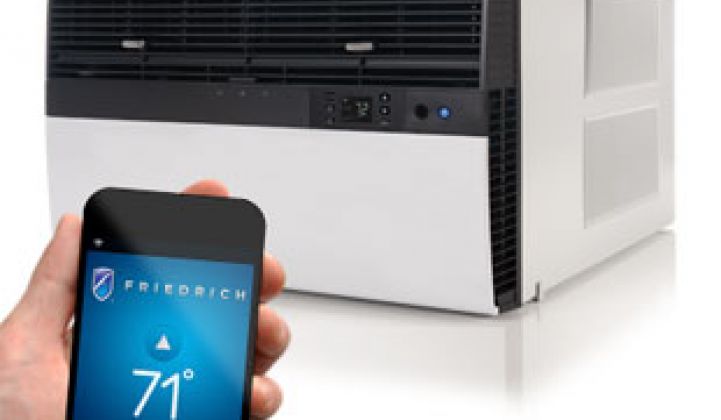If you live in an apartment or house with old, wheezing radiators in winter and cumbersome window air conditioners that you hoist into windows every summer, it can seem as though technology has left you behind when you read about the coming connected home.
But for those people (this reporter among them), there are new options in the realm of connected air window conditioners. And for at least one brand, the Wi-Fi connection can also give customers the chance to enroll in summertime residential demand response programs, during the season when electric bills tend to be highest.
Friedrich has teamed up with ThinkEco to make its Kühl (pronounced “cool”) air conditioners demand-response-ready out of the box using ThinkEco’s turnkey platform. Customers will have to purchase a FriedrichLink Wi-Fi kit (about $33 on Amazon), but can then join Consolidated Edison’s coolNYC program, which ThinkEco has been running for the past several years.
“As more utilities move to find new demand-side resources, this partnership will provide value by incorporating networked devices directly into their load control portfolio,” TJ Wheeler, director of product management at Friedrich, said in a statement.
The offering is similar to what other companies are building out on the central air system side of the business. Utilities such as San Diego Gas & Electric, Austin Energy and Southern California Edison have bring-your-own-thermostat programs that allow customers with certain brands of thermostats to get a special rebate rate for participating in summer demand response programs.
In the past two years, ConEd had equipped window ACs with ThinkEco’s modlet smart plug and a SmartAC thermostat kit, which essentially turns the room AC unit into something that can be controlled via the internet or smartphone.
Currently, ConEd is the only utility that has picked up the program, but it could be attractive to other utilities in cities whose older building stock has a high penetration of window ACs in apartment buildings.
The partnership with Friedrich takes the technology one step further by having that functionality embedded into Friedrich’s Wi-Fi platform, according to Jun Shimada, CEO of ThinkEco. Once customers have activated the Wi-Fi and have a FriedrichLink account, they can enroll in the coolNYC program if they live in ConEd territory. The deal is the manifestation of ThinkEco’s desire to move beyond its smart plug, the modlet, and have its software embedded in OEM products or offer its platform as a software-as-a-service.
Most customers likely won't buy the Wi-Fi dongle solely to earn the $25 that the program pays participants for summer season enrollment. Instead, they’ll be buying the connectivity to be able to control their window AC remotely. Consumers like to control their thermostats for comfort issues and to save on monthly bills, and any benefit of participating in a demand response program is far less of a driver to invest in the technology. ConEd's coolNYC program will have up to 20,000 participants this year.
Every program is slightly different, but many of the latest residential demand response programs rely on rebates for kilowatt-hours saved during peak events. However, that usually requires smart meters to have the detailed historical usage data as a baseline. ConEd does not have smart meters in New York City.
The partnership between Friedrich and ThinkEco is not the latter’s first deal with a well-established air conditioning manufacturer. Last year, the New York-based startup announced a partnership with Carrier so that customers could register both their central and window air conditioners in utility demand response programs. No major utilities have yet announced that they are using that platform, however.
ThinkEco has yet to make huge strides outside of New York, but there is plenty of opportunity. Window or wall air conditioning units still make up 58 percent of air conditioning in the U.S., according to the U.S. Energy Information Administration, even though central air continues to chip away at that figure. New York City alone has 6 million window ACs that ThinkEco would love to wirelessly enable.
And if you’re sitting in your living room with an overheated radiator and a window cracked open, despite the single-digit temperatures outside, don’t worry. Another early-stage New York-based startup is working on a solution to control your old heating system too.



